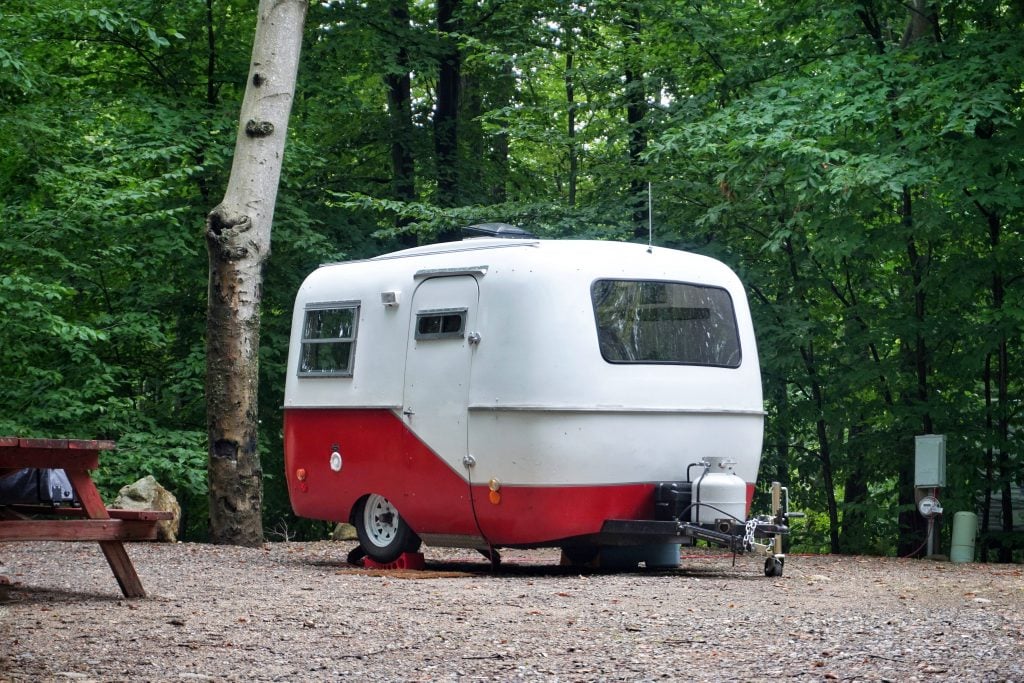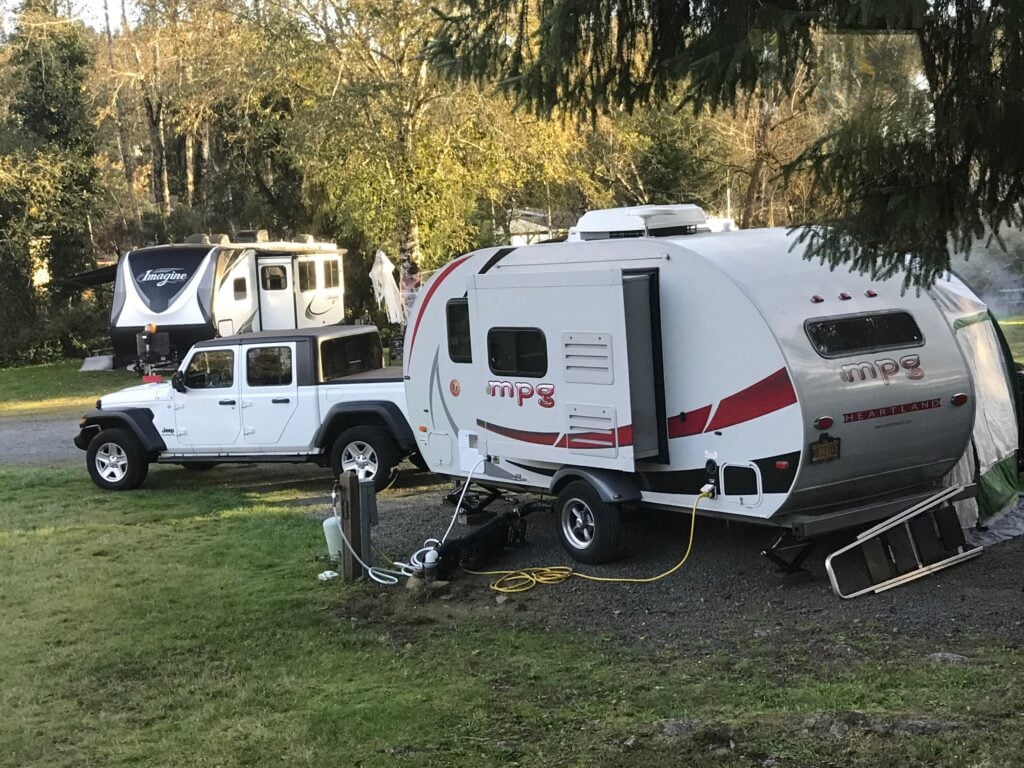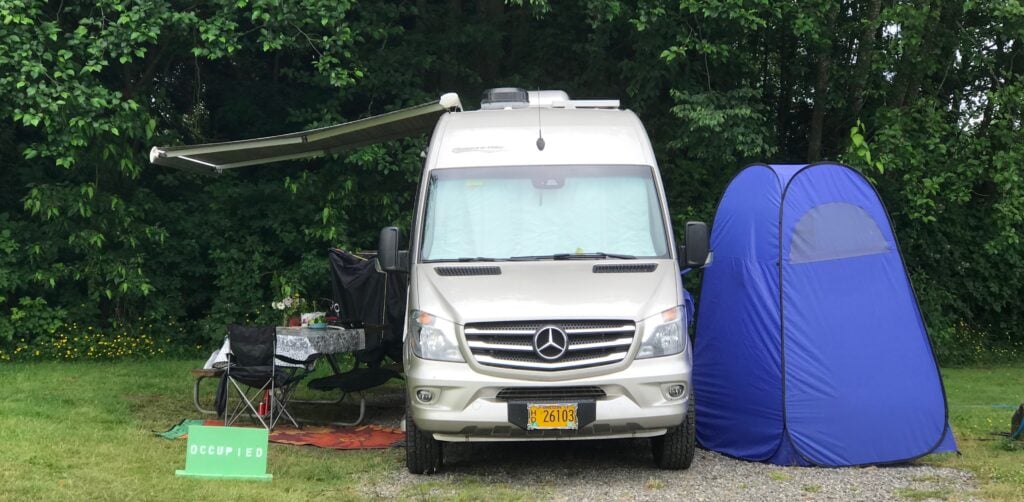
What You Need to Be a Minimalist Full-time RVer
Living in any RV requires a commitment to a more minimalistic lifestyle whether you’re in a 45-foot diesel pusher or a small truck camper or camper van.
There are a couple of reasons a trailer or camper might not be the best choice for full-time living, but it’s worth noting that NO recreational vehicle is built and sold for the purpose of becoming a full-time residence. If you talk to the manufacturers and dealers, they all affirm that RVs are built for periodic leisure use only. Living in an RV full-time puts much more pressure on every system in the rig. The electrical, plumbing, heating, insulation, tanks, and structural framework will all be stressed when in use all day every day.
This continuous use and additional pressure is what makes living in a camper vs a motorhome more problematic. Let’s face it, campers are built to fit into the budgets of a larger share of the market, meaning they are more affordable, but to fit into that lower price range they need to be built fast and cheap. That translates to lower quality components and construction protocols that focus more on quantity than quality.

- Campers are small, easy to maneuver and park, but lack storage space. Photo by P. Dent
Cons of living in a camper full-time
Smaller components
Another limitation of living full-time in a camper compared to living full time in a larger motorhome is the size of many of the components in the camper. The propane tanks (if they even exist) are usually small portable tanks. These tanks need to be refilled often. The refrigerator and freezer may be quite small. Your freshwater tank, black, and gray holding tanks also have limited capacity.
Many campers do not have a generator. Living full time in those campers requires a connection to shore power for electricity. Or, the camper needs solar panels and a battery system. A portable generator is also helpful.
Be prepared for all kinds of weather
Let’s face it, when you live in an RV you need to take a few more things with you than for camping on a weekend trip or a short vacation. You might need all weather gear. Chains for the truck or trailer, extra coats, blankets, and boots can be necessary too.
You could be camping in the snow or on the edge of a hurricane. It’s not like you can just drive back to your house to wait out the storm. You need to be able to endure whatever nature throws at you.

- Not all days are sunny when you live in a camper. Full-timers need to be prepared for everything. Photo by P. Dent
Sure, you’re living in a house on wheels. You should be able to drive away from approaching bad weather. But this is not always possible. For example, a Polar Vortex dropped below freezing temperatures from one coast to the other. It resulted in virtually the whole country suffering in below freezing ice and snowstorms. This storm knocked out power to millions. Thousands of full-time RVers got caught in this dangerous weather.
As full-time RVers, sometimes the only option is to batten down the hatches and endure the inclement weather. But this may be a life-threatening experience in a camper. Without enough extra clothes or blankets, no propane heat option, and the power is out where you’re camping, things get dicey. Larger storage capacity in your full-time recreational vehicle can save your life.
Limited RV storage space
Beyond having enough storage space for seasonal clothes and bedding, you also may want to take your recreational accessories with you like your bikes, kayaks, fishing gear, photo equipment, and backpacks. All that extra gear that you would normally store at your home now needs to be packed and stored in (or on) your RV.
And the storage issue is not limited to outdoor equipment or weather-related supplies. What about extra food? When you live in a camper, you’re not packing food for just a weekend getaway. You’re packing all the food and cooking utensils for everyday meal preparation and there are times when you may be a hundred miles or more from the nearest store.
With a very small refrigerator and freezer, you’ll need to rely on dry goods or canned foods. But all of it takes up space. Many campers are short on good storage space. Are you willing to park your rig near an urban center? If so, you can eat out more often or purchase smaller quantities more frequently. But you can’t always be that close to a grocery store.
Over the past 20 years of RVing, we have camped in dozens of places that just didn’t have any nearby restaurants or groceries. We ate what we had with us and that was all. If you’re in a small truck camper, camper van, or pop-up trailer, you may not have enough storage to sustain a comfortable full-time lifestyle.

- Even with a wet bath, campers may need an exterior shower arrangement. Photo by P. Dent
Pros of living in a camper full-time
Easier maneuverability
There are a few pros to choosing a camper for full-time living. The biggest advantage is that campers are more nimble than large motorhomes and fifth wheels. They can go anywhere a car can go. Campers fit into any campground or RV park They are easy to park in a parking lot of any store while restocking the rig.
If you have a truck camper, you can even remove it from the truck. It’s easy to use the truck without breaking down your camp to fetch supplies. There’s no need to tow a second vehicle unless you want to tow a trailer or boat. We encountered a full-time RVer that lives in a camper van. They also tow an enclosed trailer. She manages all her storage issues by loading the trailer with extra gear and supplies.
More affordable
The other pro of choosing a camper for your full-time adventure is that most of them cost less than a motorhome or fifth wheel. Having said that, I have to acknowledge that some of the camper vans can be as expensive as many Class A and C motorhomes.
Some campers that are in the larger hard-sided trailer category can also be nearly as expensive as smaller Class C motorhomes. We are currently camped next to a hard-sided trailer that is only a few feet shorter than our 38-foot motorhome and the couple who lives in that trailer seem to be well supplied and content with their rig.
Will a small camper meet your personal full-time RV goals?
That depends on you! It depends on your attitude, and your willingness to leave unnecessary material possessions behind. Can you embrace a minimalist viewpoint? Are you comfortable in confined spaces? It depends on your willingness to embrace an outdoor lifestyle. Ultimately, can you be content with your choices?
Drivin & Vibin shares some great tips from their experience in living in small camper full-time in the video below:
Continue reading: The Dirty Truth Of Full-Time RVing

i luv these stories
Hi, I live full-time in a Class A Motorhome. Prior to that, we lived full-time in a 5th Wheel. We have owned a pop-up, two travel trailers, and another 5th Wheel.
All of these recreational vehicles are also referred to as campers. Your article is confusing, especially for those wanting to embrace and learn about this lifestyle.
What do you consider to be a ‘camper’? Is it a small travel trailer? A van? A pop-up? Most of the people I meet in our travels use the term ‘camper’ when referring to any type of RV.
I think it would be helpful to your readers to specify the type of RV and length when explaining your take on living in them, rather than the generic ‘camper’.
Safe travels,
Peggy
For many living in an R.V. of any sort isn’t a life style choice but rather a necessity. Housing is expensive and many simply can’t afford it. In Vancouver, British Columbia, living in R.V.s on city streets, full time, and working full time is simply a necessity. Housing is just too expensive. A house will cost you $3M. Rent on a 450 sq. ft. condo, $1450 per month.
Some got out of the market to travel in their large 5th wheels or motor homes and found they couldn’t afford to get into the market again. They found it simply easier to park their R.V. in a camp ground permanently and perhaps move once or twice a year. Enjoyed the article and it presents information on which people can make choices, but for some there is no choice, its just too expensive to rent or buy if you live in Vancouver, B.C. or Toronto, Ontario and the surrounding areas. R.V.s keep a roof over your head, keeps you safe, and enables you to save a bit of money.
I’m, about to wave Goodby to a 40 year relationship with a lovely woman who has a heart of gold But
We have steadily grown apart I want to get out and be myself I’m sure I
Will be ok But what about parking up for the night. ? I will only have my pension so will try to park free ! Is this a problem ? My vehicle will probably be about the size of a Ford Transit ! Regards Barry
We are living in a 37′ A full time. We do own a lot in a rural area on a lake in a resort. We also just bought a property to escape to when the resort is too hectic. It is like a private campground on 2.5 acres..you can’t see another human and we are right in town! That being said, we will soon take off heading west and spend the rest of the year on the road..flying by the seat of our pants! Great way to live..the RV is a 2003 and in great shape. We only hook up to electric so our systems are not over used. It’s not glamorous the way we travel, but is a lot more fun than spending our older age in one spot!
The RV full-time dream being sold by the industry, clickbait community, and particularly the mail forwarders, is a myth. A full-time RVer has no legal residence and will be labeled a terrorist, banned from using the U.S. banking system. You ever tried traveling without access to a bank account? This is the result of the USA PATRIOT Act, section 326, the banks CIP mandate. People are being victimized by this full-time RVing disinformation. If you sell your home and decide to live in an RV, then prepare to have all your assets frozen, your right to vote revoked, and your health insurance put in jeopardy. You should Cease-and-Desist with this messaging.
I have a quesrion: My adult kids are living in a 25’ trailer on our land. Have septic and a Well. Normal electricity. We are all new to this. (Previous city people). Hot summers and snow winters. Does the hose line attached to house spigot to trailer for fresh water be left in on position? Or do they fill up fresh water trailer tank and turn off spigot at house so it isnt on 24/7?
Kevin: I don’t know where you got your information about full-time RV traveling but you are all wrong!!
I think you are the one who should cease and desist with your fake information!
You can leave the water turned on at the house. Some RV’s have a switch to turn off the rv water pump for the fresh water trailer tank when you are using a hose from outside source that has water pressure. Some RV’s have different locations on them to hook you’re outside water hose and possibly another inlet to fill the freshwater tank.
I know, I understand this article and website are for RVing, mainly in the US full time. However, I’m a retired full-time domestic and world traveler. There is a whole world out there waiting for you to explore.
I live in and travel full time in my truck camper for about half the year. I travel around the states during the warm months, but never in the snow or places where I’d get blown away by a hurricane.
At the end of the summer season, I put my camper into storage and take off for somewhere else in the world, mainly to tropical countries in Central and South America and Southeast Asia. My experience is that I can live very well on way less cost than I do while I travel in the USA, and much safer too! I’m also helping out to relieve the overcrowding in the RV parks here while I’m gone.
How strong would the wind have to be to blow me over I’m not tied down I’m 9scared of storms I live in my camper at Mooreville Mississippi
I agree, camper, camper, camper, so what type is being referred to. Personally, I would not want a trailer camper, or a pickup camper. Because I do not want to have to get out of the vehicle to use the toilet, to eat, or anything else. I want to leave the driver seat and move to the rear. So, am working on a van conversion camper. Should have room for all the vittles I want and need – refrigeration and freezer, what my answer is would likely scare a lot of you, so let it be said those are not issues. But, if not enough space for food, a small trailer will take care of that. As for heat, no propane, rather a coal/wood stove will provide heat, but there are other ways also to heat. Cooking, not decided yet, could be charcoal, wood, kerosene, alcohol, plenty of time to decide. For water, no filters, distill it, and the same unit could be used for distilling alcohol for fuel, for a generator, cooking, heat, and the distilling could be fueled by wood. I will be using solar, wind, possibly charge batteries from the engine, and a small DIY generator.